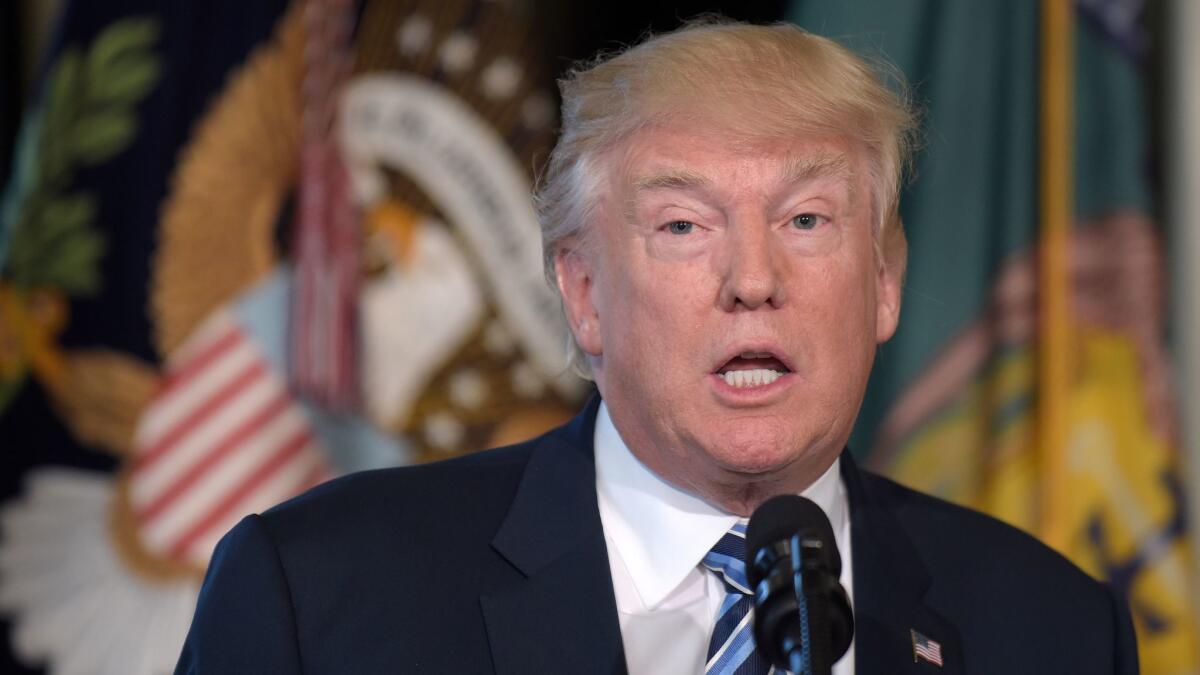Column: Introducing the Trump Rule: Ignore every proposal he makes

Remember March, when Democrats were in a swivet over President Trump’s budget proposal – the one that threatened to gut the Environmental Protection Agency, eliminate funding for public broadcasting and the arts, and use the money for a border wall?
Never mind. The spending bill Congress produced this week cuts the EPA by all of 1%, increases spending on the arts by $2 million – and prohibits any spending on a wall. It was – gasp! – an old-fashioned bipartisan compromise, with Republicans getting more money for defense and homeland security. But conservatives were furious. Rush Limbaugh called the bill a “disaster.” Members of the House Freedom Caucus said this wasn’t the small-government tsunami they were promised.
That’s the story of the Trump Revolution so far: big, disruptive promises, followed by confusion, wrangling in Congress and the courts -- and only modest adjustments to the status quo.
The president’s biggest campaign promises have mostly been stymied. There’s been no repeal of Obamacare. (Even if the House passes a healthcare bill, Obamacare will survive in some form.) No withdrawal from NAFTA. No trade war with China. No infrastructure plan to provide jobs for construction workers. No deportation force to go with the unbuilt wall.
Congress hasn’t started on Trump’s tax proposal yet, but it’s already shrinking.
President Trump doesn’t pay attention to the details of his administration’s plans; why should you?
To be fair, the president’s only just finished his first 100 days. Aides promise his big legislative push, including a real Trump budget, will come over the rest of the year. But they haven’t explained why anyone should expect the results to be much different.
Meanwhile, Trump’s showmanship has been exhausting to watch, just as it was during his presidential campaign. And he never breaks stride; in fact, he keeps musing publicly about other big things he might want to do. He startled his aides this week by telling Bloomberg News that he’s “looking at” proposals to break up big banks and that he’s open to raising the federal gas tax. Neither one looks likely.
So we need a Trump Rule to calm our nerves: Ignore every proposal he makes.
President Trump doesn’t pay attention to the details of his administration’s plans; why should you?
They’re not going to go into effect in the form they first appear. They may not go into effect at all. Like the White House budget blueprint in March, they’re about campaigning, not governing – declarations of attitude, not real legislative goals.
Most presidents husband their words carefully, don’t make promises they can’t keep, and don’t make threats unless they intend to carry them out. Not Trump. He’s devalued his own words.
Wall Street has figured that out. On Monday, when Trump gave that surprising Bloomberg News interview, the financial markets ignored him. In fact, bank stocks closed up.
Congress has figured it out too. The reason this week’s spending bill didn’t look or sound like a Trump Revolution is that the leaders of both parties asked the president to stay away. They needed to work out a compromise to avoid a government shutdown, and they didn’t want the White House messing it up.
“As a Trump supporter, I do my best not to pay attention to what he says,” former Republican congressman Joe Walsh told NBC.
That doesn’t mean everything the president says or does is inconsequential. His words have often been empty; his decisions, not so much. When he doesn’t need money from Congress – for immigration enforcement or environmental deregulation, for example – he can do a lot. He still has wide authority in foreign policy; he can order military action anywhere in the world. And, as he pointed out in lieu of other early achievements, he can still nominate justices to the Supreme Court.
Trump has complained about the rules of Congress, which get in the way of wholesale change. On Tuesday, for example, he said the Senate’s 60-vote threshold was to blame for any shortcomings in the spending bill. (“Our country needs a good ‘shutdown’ in September to fix mess!” he added – just the kind of outburst the Trump Rule was designed for.)
That’s not the only reason his agenda has stalled. It was the House, not the Senate, that got in the way of his healthcare bill; its GOP members aren’t anxious to risk their jobs for the sake of a president whose judgment seems unreliable. But Trump is right that the Constitution, the traditions of the Senate and the prickly independence of the House have gotten in his way. They’ve made it much harder than he expected to turn his campaign speeches into law. That means they’re working exactly as intended.
Twitter: @DoyleMcManus
Follow the Opinion section on Twitter @latimesopinion or Facebook
More to Read
A cure for the common opinion
Get thought-provoking perspectives with our weekly newsletter.
You may occasionally receive promotional content from the Los Angeles Times.











